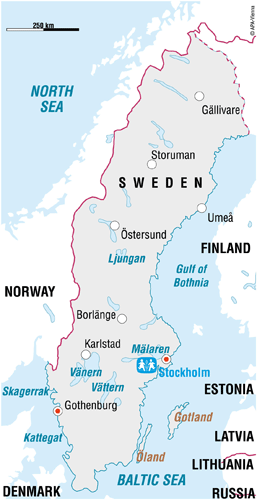
Vi er i Sweden
Some facts about Sweden
The Kingdom of Sweden is a constitutional monarchy in Northern Europe situated in the Scandinavian Peninsula. The country borders Norway in the north and in the west, Finland in the north-east. It includes the islands of Gotland and Ãland in the Baltic Sea. Sweden's capital city is Stockholm with about two million inhabitants in its metropolitan area.
The population is 9.4 million (2011 est.), the majority of which are Swedish. A Sami minority of 17,000 lives in the north (in the Swedish part of Lapland). About 14 per cent of people who live in Sweden were not born there. The largest groups include people from Finland, the former Yugoslavia, Iraq, Poland and Iran. There are also a number of people from other European, and especially Nordic, countries. The official language is Swedish, with Sami and Finnish minorities using their native languages.
One of the highest levels of social spending in Europe
Sweden has one of the best living standards in the world. Although the spending on social welfare has been reduced in recent years, the county still has one of the highest levels of social spending in Europe. Sweden ranks among the most egalitarian societies in the world – it has one of the lowest levels of poverty and income is distributed more equally than elsewhere. Equality is enforced by legislation which is overseen by an Ombudsman.
People living in Sweden have access to a good health-care system. Swedes have one of the highest life expectancies in Europe – 79.1 years for men and 83.2 years for women – and the infant mortality rate is very low.
In 2008, around one per cent of the active population was employed in agriculture and 28 per cent in manufacturing. The main employer was the service industry, employing around 71 per cent. The unemployment rate was 6.4 per cent, but increased to 8.3 per cent in 2009.
Situation of the children in Sweden
There are just under two million children living in Sweden. The rights of children are well-protected – through laws, through various organisations and through an Ombudsman.
Swedish children have to attend school for nine years, but around 90 per cent choose to continue their education for a further three years. About a third go on to acquire tertiary education. The principle of egalitarianism is also applied to education – there is universal access to schooling, children over the age of one are guaranteed a place in a kindergarten and all children get a free school lunch.
Around three quarters of children live with both their birth parents and a further quarter live with one step-parent.
SOS Children's Villages in Sweden
SOS Children's Villages Sweden does not have family-based care in the country. The association, which is located in the capital of Stockholm, raises funds for the work of SOS Children's Villages in all parts of the world.
At the end of the 1970s, the Swedish SOS Children's Villages association was able for the first time to take over the responsibility for financing an entire SOS Children's Village, SOS Children's Village Pune in India. Since then it has funded many SOS Children's Village Programmes all over the world.
Website of SOS Children's Villages Sweden
(available in Swedish)